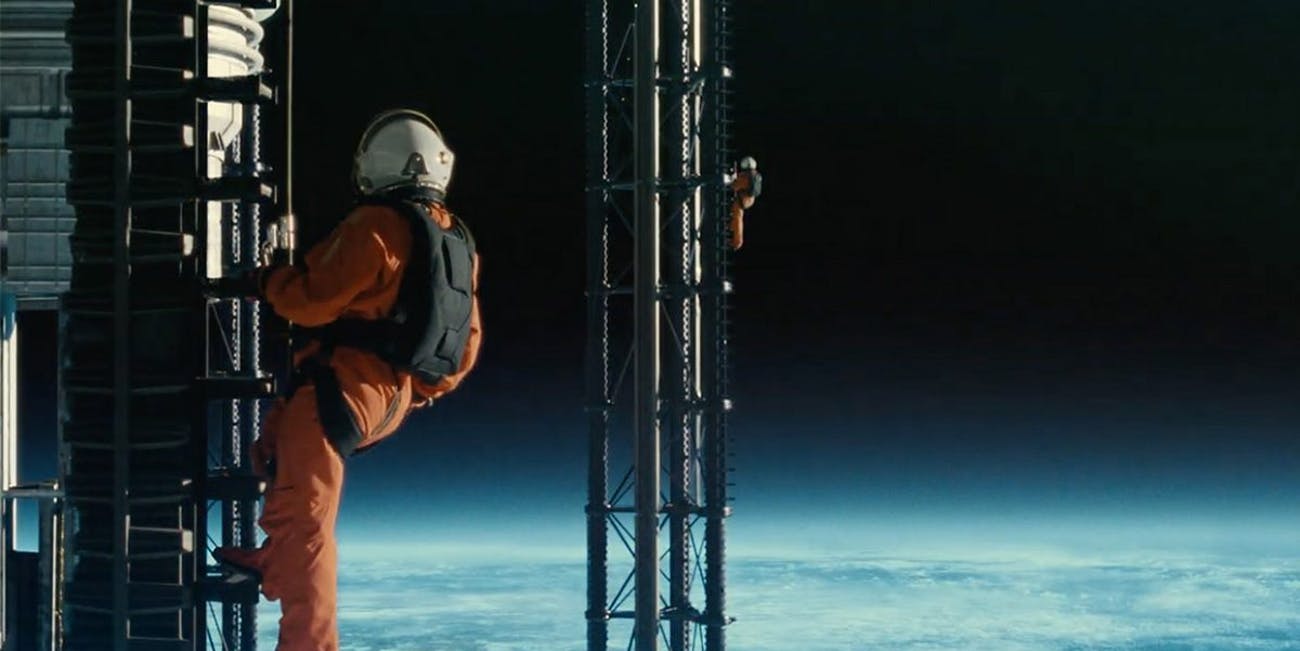The premise of Ad Astra – so cleanly communicated in the trailer – seems to give away the farm. Brad Pitt plays a near future astronaut who discovers his father (Tommy Lee Jones), a space exploration pioneer long assumed dead, is not only alive but has possibly lost his mind and now serves as a direct threat to all life in the universe thanks to whatever he’s up to in the far-flung confines of his Neptunian space station. To save the world, Pitt’s character will have to first find and then confront his wayward father.
Thankfully, that’s about the only thing the trailer gives away, but it’s enough that I walked into Ad Astra last night with a general expectation that this is what I’d be getting: a movie about fathers and sons, with the vast chasm of space separating the two serving as a metaphor for the emotional gap between an abandoned son and his irresponsible father. Somewhat frustratingly, that is exactly what Ad Astra delivers.
Sure, the script devotes some energy over to the fallibility of heroes, the need for our masculine ideals to either die or adapt, the inevitable commercialization of everything (there’s an Applebees, on the moon!), and the role religion plays in our search for meaning. However, this is ultimately a movie about a practically catatonic, emotional robot of a man (Pitt’s Major Roy McBride) finally allowing himself to cry in the face of parental abandonment. Plus, he fights moon pirates, but it’s mostly about the dad stuff.
If I sound cynical, it’s not because I’m above father and son stories (love ya, Field of Dreams) nor was I blessed with a trauma-free experience with my own father (see this review for a bit more about that). No, father and son stories are usually my jam because, the emotional wounds, they be raw.
However, Damien Chazelle’s First Man just did this kind of thing last year, and James Gray was up to the same tricks three years ago with The Lost City of Z. The grand history of cinema is already overfilled with male filmmakers, particularly those from the film brat generation, working through their own daddy issues, often using metaphor to reflect on their own trauma and whether they’re repeating their fathers’ mistakes with their own kids.
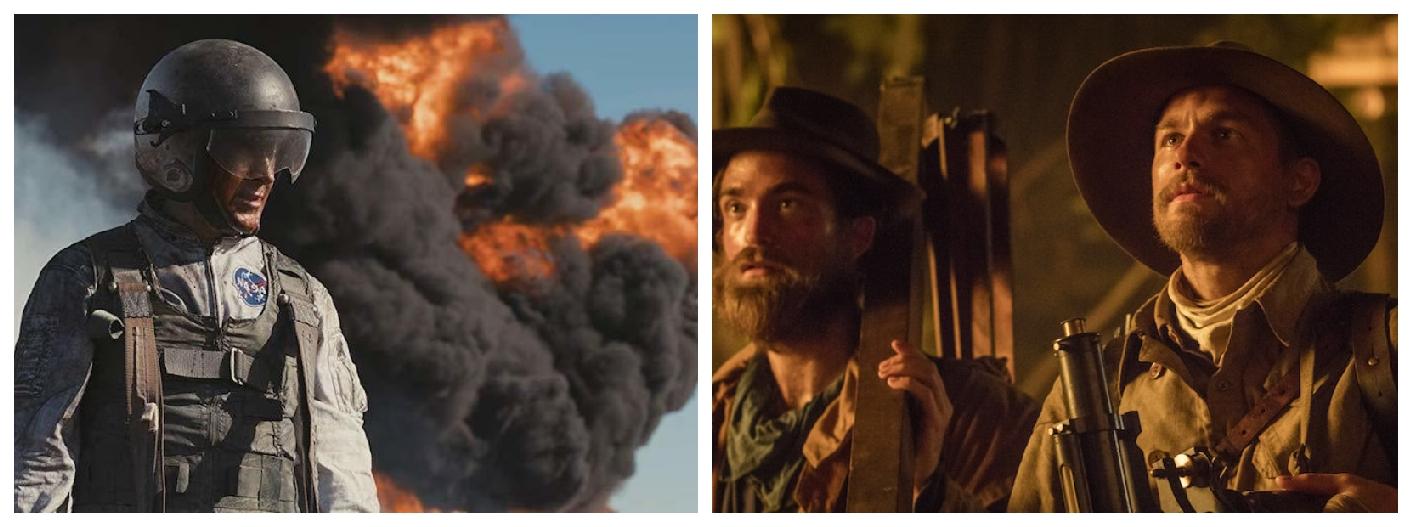
Twenty years ago, Brad Pitt disdainfully observed, “We’re a generation of men raised by women,” and although those words came out of Tyler Durden’s mouth and thus carry cultural, anti-Fight Club baggage they still speak to the reality that we live in a world of failed fathers and generational resentment. We’re constantly re-examining the failures of past generations. We rail against toxic masculinity. We blame the old for electing Trump, poisoning the planet, and making sure that Green Book must always come with the prefix “Best Picture Winner.”
The old, who are living longer than ever, and the young, who are more anxious than ever, are going to have to fight it out. It’s not going to be pretty. As I write this, for example, we are still only 72 hours removed from the historic spectacle of a 17-year-old female climate activist scolding a 47-year-old Louisiana Congressman with the following put-down:
When your children ask you: Did you do absolutely everything in your power to stop the climate crisis when the storms were getting worse and we’re seeing all the effects … Can you really look them in the eye and say, ‘No, sorry, I couldn’t do anything because that country over there didn’t do anything, and if they’re not going to do anything then I’m not.’ That is shameful and that is cowardly.
Jamie Margolin to Rep. Garret Graves, possibly the first modern instance of a Congressman being “canceled” on live TV
If that same activist were to watch Ad Astra, she might come out asking, “How many times must we watch movies about sons despairing over their shitty dads? Let’s give a female director $80 million to make a movie about space exploration and see what she does with it.” Claire Denis got less than $2 million to make High Life last year and she produced a space movie quite unlike anything we’ve ever seen before – celibate prisoners, black holes, artificial insemination, and Robert Pattinson!
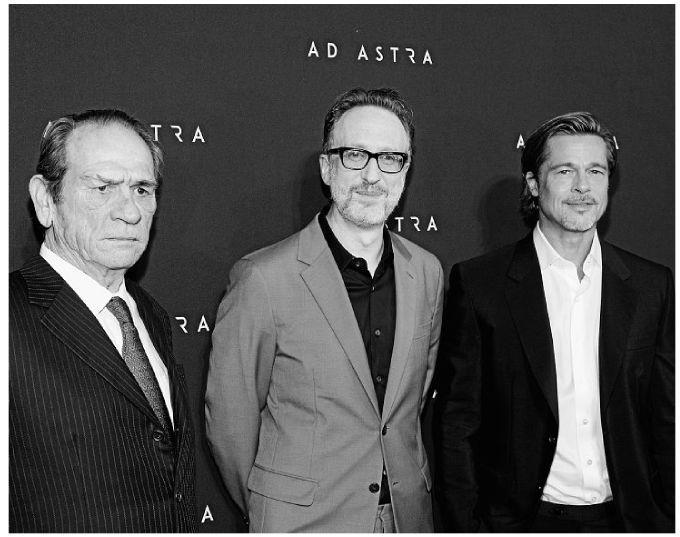
James Gray, however, can only make what’s personal to him, and as a man who just turned 50, he’s going through a mid-life reassessment. When he made his first film, 1994’s semi-autobiographical Little Odessa, his head was still spinning from just how quickly his family fell apart. As he told The New Yorker, “In a very short time, my father had his legal troubles [he was convicted of bribery], my brother went to college, my mother died, and I went off to California.”
25 years and 7 movies later, Gray is now quite preoccupied with fatherhood, both as a father to three children of his own and as the son of a man who taught at the New York Institute of Technology and would routinely read magazines in supermarkets after work instead of going straight home, avoiding his wife and kids for just a while longer. Gray describes Ad Astra as his most personal movie, and it does appear to be a transparent retelling of his own father-son drama through the prism of a space exploration story in which the protagonist has to travel literally 2.7 billion miles just to talk to his dad.

Substitute the Amazon for space, however, and Ad Astra stands as an obvious companion piece to Gray’s last movie, 2016’s underseen gem The Lost City of Z. In the historical epic, a British explorer (played by Charlie Hunnam) becomes obsessed with finding a fabled lost city, which results in his children (chiefly eldest son Tom Holland) growing up with resentment in their hearts before they join his cause as a means to finally connect.
In Ad Astra, the story is told from the son’s point of view instead of the father’s, but Pitt’s Roy McBride goes on a familiar journey, joining future-NASA just like his dad but also growing to internalize all of his depression and loneliness and prioritizing work over family just like his dad. His ex-wife, Liv Tyler’s Eve, is practically a ghostly apparition, with the majority of her “I’m worried about you” trailer dialogue failing to make it to the final cut.
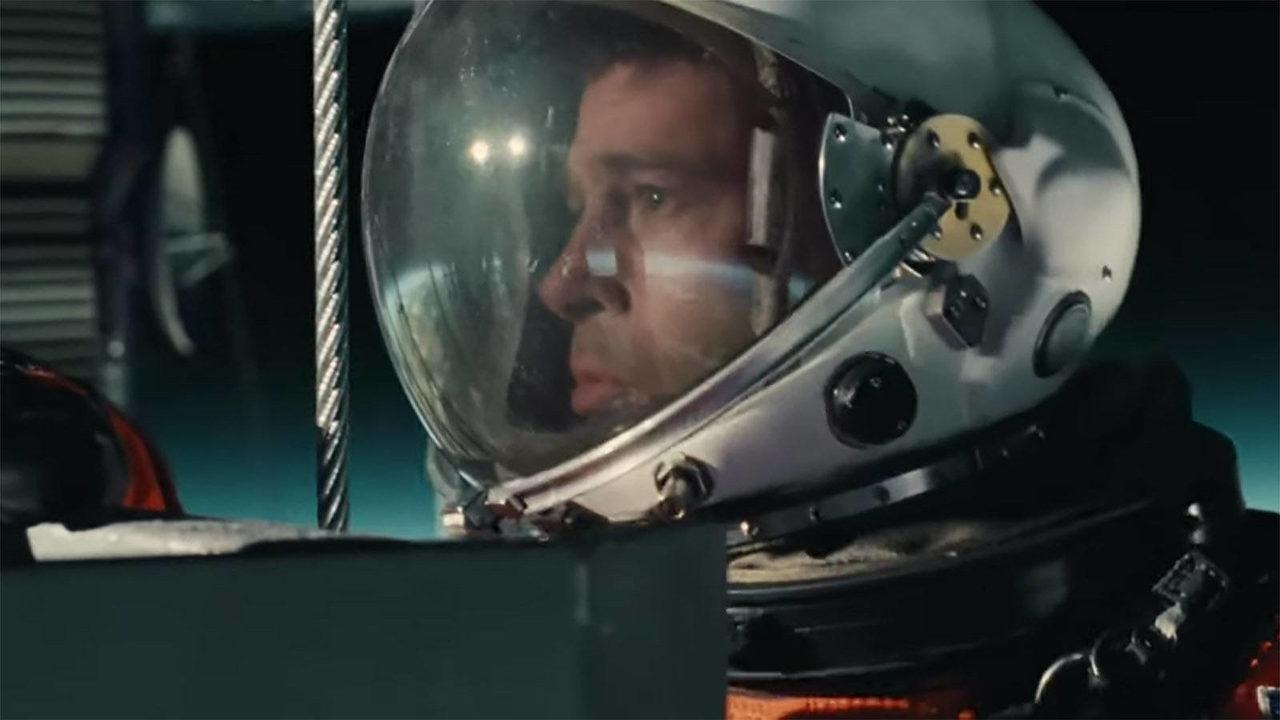
Commanding the screen solo for at least half of the movie, this is as vulnerable a performance as Brad Pitt has ever committed to the film, and whether he’s fighting moon pirates – the less spoiled about that the better – or flashing a thousand-yard stare at the vast emptiness of space he never loses his unique mix of steely resolve and crippling depression. It will lead to plenty of Oscar hand-wringing over whether to nominate Pitt for this, Once Upon a Time in Hollywood or both. (My vote is for both.)
For Gray – a director known by US cinephiles, adored in Europe, but otherwise unknown and forever challenged to secure funding for new projects – Ad Astra is his chance for actual mainstream success. All the right people in Hollywood saw The Lost City of Z, and Gray’s reward is a career-best budget and unprecedented partnership with one of the last true movie stars. (Pitt, it should be noted, was also a producer on Lost City of Z.)
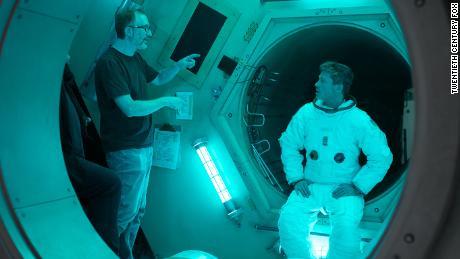
Next up for Gray is a stage production of The Marriage of Figaro and an autobiographical drama about growing up in 80s New York and attending the same prep school as Donald Trump. Unlike everything he’s made over the past decade, Gray won’t have to travel away from his family nearly as much for that. As the guy who just made a movie about appreciating what’s in front of you, he appears to be listening to his own message. Filmmaker, heal thyself.
THE BOTTOM LINE
As long as men continue to disappoint their sons, we’ll get movies like Ad Astra. May they all be as visually stunning as this. Even when the story sags and metaphor disappoints, Ad Astra’s visuals astound. Gray and his team tackle such things as zero gravity fights and daring races through underground Martian lakes. Cinematographer Hoyt Van Hoytema (Interstellar, Dunkirk) turns several shots into practical paintings, following Pitt into the void.
Still, as a character study of a career-focused, emotionally neutered man finally gaining closure on his father-son relationship and thus learning to open himself up to life a little more, Ad Astra doesn’t exactly break any new ground. In fact, it’s more interesting ideas – there’s an Applebees on the moon! – are sadly sidelined in favor of sad Brad Pitt looking sad and saying sad things. However, James Gray got $80 million to make a movie about a sci-fi movie about depression and fraught father-son dynamics. That alone is a true wonder, and while I didn’t love Ad Astra I find its mere existence fascinating.
RANDOM PARTING THOUGHTS
- Natasha Lyonne, in full Russian Doll mode, shows up for one scene. It’s always nice to see her in anything.
- After Armageddon and Ad Astra, the film universe owes it to Liv Tyler. Someday, clearly, she gets to be the one who goes to space, not the love interest/daughter stranded on Earth.
Ad Astra and you. Search your feelings. You know you have some thoughts about this movie and/or my review. Why not share them with me in the comments?

